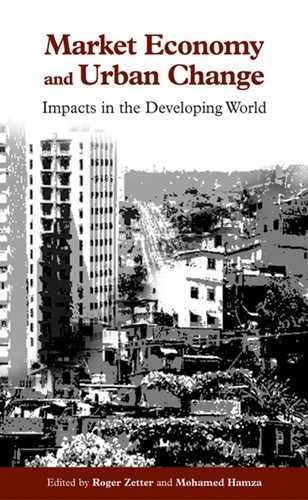0%
19Chapters
0-1Hours read
0kTotal Words
Book Description
Across the developing world the preceding decade or so has witnessed a profound reconfiguration of the political economy of urban policy. This new policy environment is driven by globalization, the neo-liberal macro-economic package of 'market enablement' and structural adjustment, which now form the dominant development paradigm. The consequences of this approach for urban development agendas and ultimately the lives and livelihoods of millions of people across the globe are profound. Market Economy and Urban Change explores and evaluates urban sector and development policies in the context of market enablement, and the associated instruments of structural adjustment, urban management reform and 'good' governance. By articulating the linkages between this neo-liberal development paradigm and the way different actors in the urban sector enact policy responses, the book provides an understanding of both the factors driving market enablement, and its impacts on urban sector policies and programmes. With case studies drawn from countries such as Egypt, Mexico, Kenya, Brazil, Colombia and transitional economies, the book focuses in particular on the implications for land, shelter and related sectoral policies for poverty alleviation. By linking policy to practice, the book seeks to inform policy-makers in governments, donor and implementing agencies of the impact of shifts in the development debate on urban sector strategies.Table of Contents
- Front Cover
- Market Economy and Urban Change: Impacts in the Developing World
- Dedicated
- Title Page
- Copyright
- Contents
- List of Contributors
- Dedication
- Preface
- List of Acronyms and Abbreviations
- 1 Market Enablement and the Urban Sector
- 2 Developmental Welfare and Political Economy: Reflections on Policy-conditioned Aid and Strategic Redirections of International Housing and Urban Policies, 1960–2000
- 3 The State, Foreign Aid and the Political Economy of Shelter in Egypt
- 4 Tackling Urban Poverty: Principles and Practice in Project and Programme Design in Kenya
- 5 Bridging the Rural–Urban Divide: What Can the Urban Learn from the Rural? Reflections on the Case of Mexico
- 6 Between Command and Market Economies: The Changing Roles of Public and Private Housing Sectors in Transitional Economies
- 7 Urban Land Tenure in Brazil: From Centralized State to Market Processes of Housing Land Delivery
- 8 Market Enablement and the Reconfiguration of Urban Structure in Colombia
- Index
